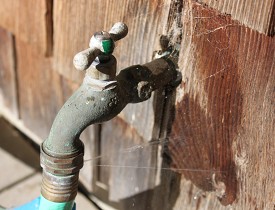Water Conservation is Easy With These Tips
 With water scarcity is a growing issue around the world, so making the most of water resources is critically important even in regions where drought conditions haven’t been declared. Using water responsibly ensures that there’s enough to go around for agriculture as well as the natural environment, and reduces the risk of a drought emergency.
With water scarcity is a growing issue around the world, so making the most of water resources is critically important even in regions where drought conditions haven’t been declared. Using water responsibly ensures that there’s enough to go around for agriculture as well as the natural environment, and reduces the risk of a drought emergency.
There are a few simple measures people can take around the house to decrease the amount of water they use, as well as some more complicated options for advanced players. Justin Calvino, cofounder of the Regenerative Design Center in Mendocino, California, specializes in permaculture and sustainability. He’s also intimately familiar with water systems, and provided some helpful hints for cutting down on water waste around the house.
The first is obvious: Make sure all plumbed fixtures are in good shape. Replace washers on leaky faucets to reduce water loss, and check valves regularly to make confirm they’re operational. If plumbing problems arise, fix them early; it saves money, limits the risk of damage (like rot) caused by leaks, and cuts water loss. Also consider measures like replacing faucets and showerheads with low-flow versions.
He says, “Using water [we] should pay attention to conservation, stacking functions, and efficiency. We should use the least amount of water possible, ideally use it more than once, and do so with the least amount of work, moving it the least distance.”
The level of difficulty involved with water conservation can vary depending on the home; for example, some households collect grey water and route it to the garden for irrigation, which requires some plumbing skills and may need a permit. Others might want to start with collecting water while taps and showers warm up and using it for gardening instead of allowing it to pour down the drain.
In the house, appliances and showering tend to be the big water suckers. Fortunately, a number of energy-efficient appliances are available, including used and refurbished models for households that can’t afford new ones. In some regions, government rebates are available to help people upgrade appliances, or they might be able to get assistance from local organizations that promote sustainable water use. Appliance stores often have information on available programs and how to apply.
In the shower, using water strategically can help, especially in a house with multiple residents. Simple on-off switches are available to allow people to adjust the water temperature to their taste at the start and then turn off the showerhead while soaping up without disturbing the heat setting. They can turn the water back on to rinse, saving water by not leaving the shower running when they don’t need it. Not leaving water running while brushing teeth is another useful water-saving measure that can also help people stay conscious of resource use.
The big area for water consumption in many homes is landscaping, particularly in arid locations. Calvino has two suggestions for helping people reduce water needs in their landscaping: Use native plants, and consider xeriscaping, a practice the focuses on plants with low water demands. In any garden, watering in the morning is best, as it reduces stress on plants and limits the risk of plant diseases, and it’s important to water before the heat of the day to minimize evaporation loss. For maximum efficiency, it can be helpful to use a drip line, which delivers water precisely where needed.
In regions with a wet season, people can also capture water for future use. Dug swales and berms can be sculpted to add texture to the landscape while also directing water into a collection area for storage, and rainwater can also be stored for future use. Calvino cautions that homeowners should check on the legality of rainwater collection, as there may be restrictions on it in some areas. It’s also important to keep stored water covered and cool, as standing warm water can attract insects.
s.e. smith writes for Networx.com.
Looking for a Pro? Call us (866) 441-6648

Plumbing Average Costs
Plumbers Experiences

Tree Removal And Backyard Cleanup Make A New House Feel Like Home

Yard Cleanup And Lawn Care Service With A Great Work Ethic



